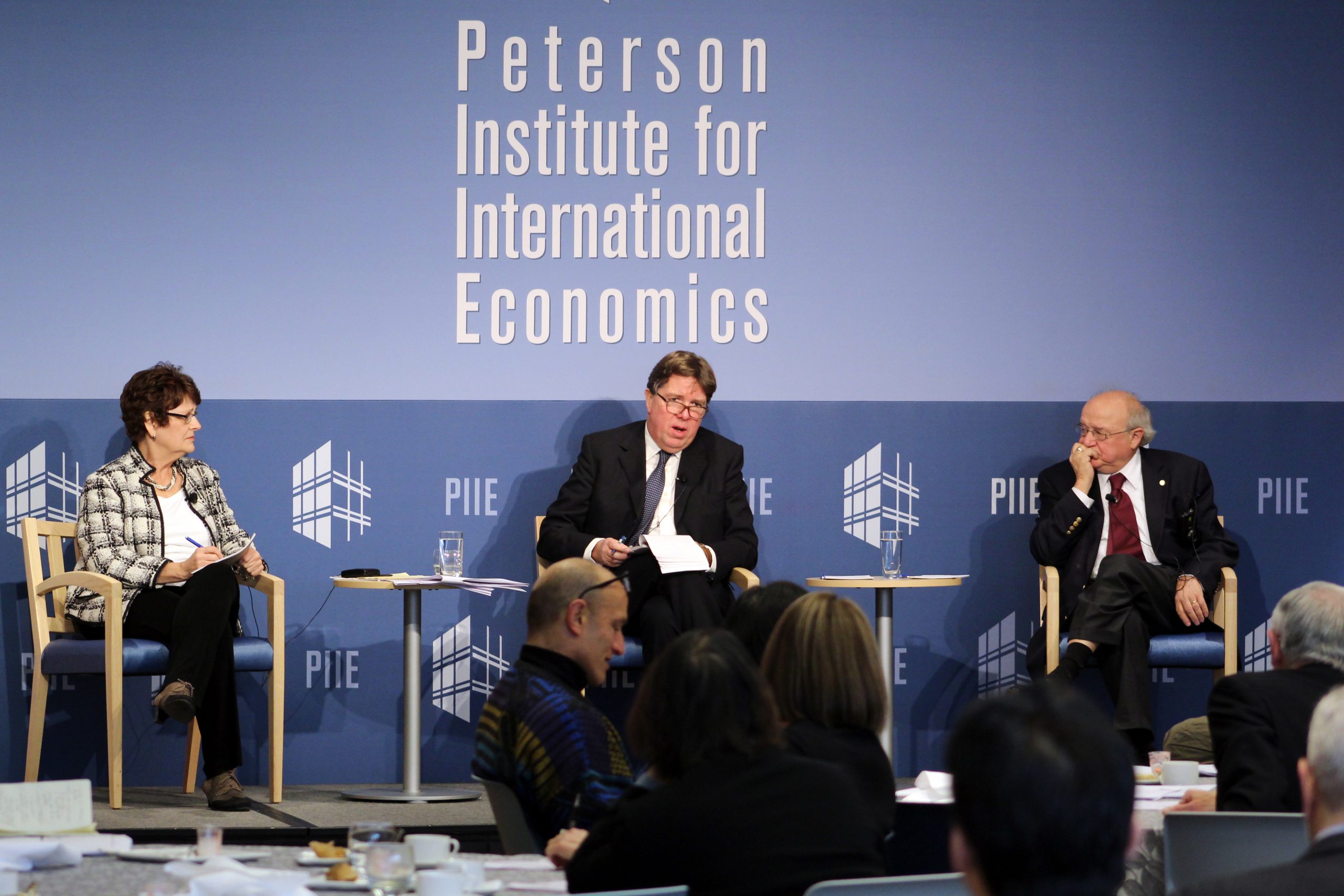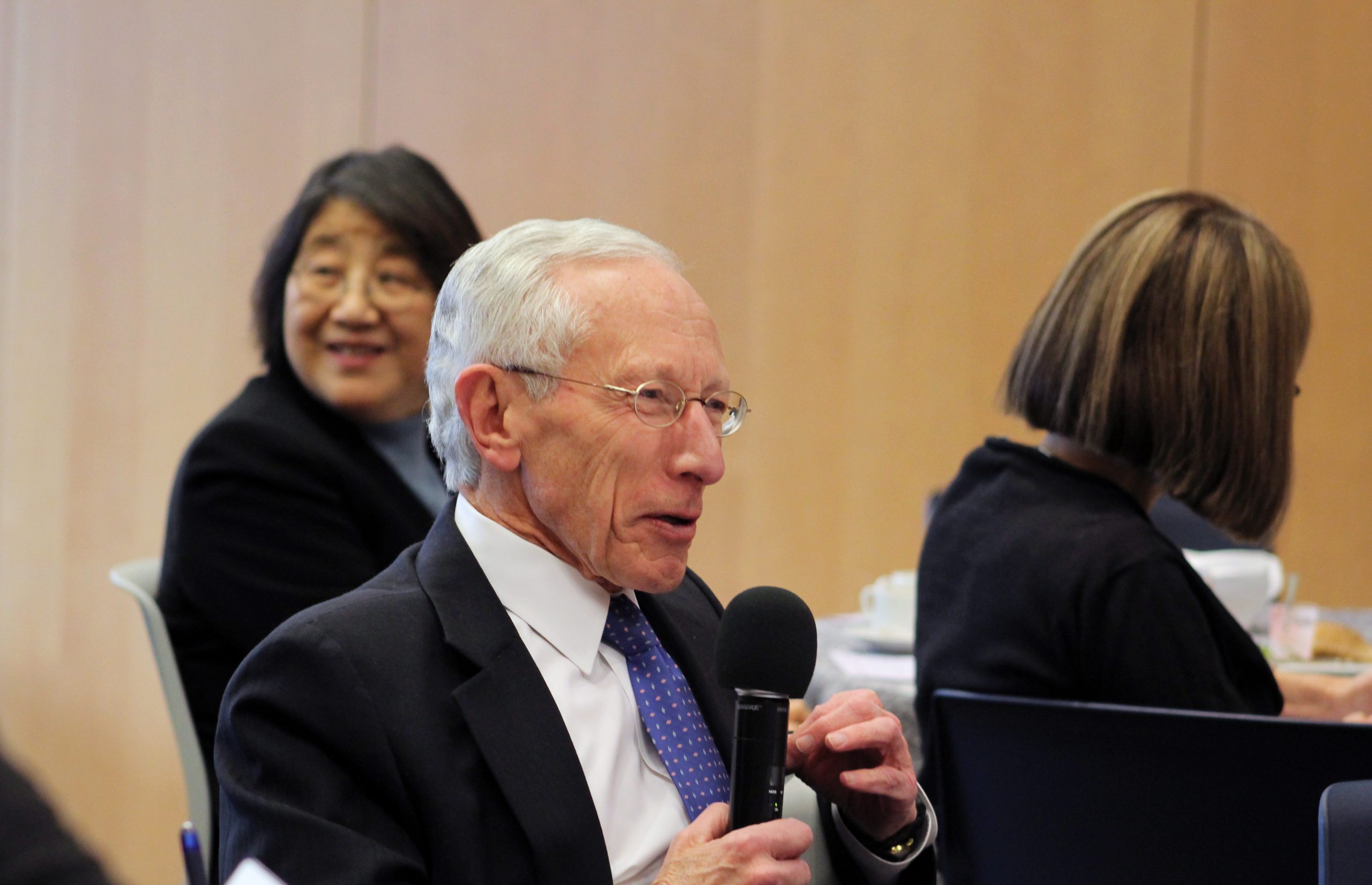Reforming the International Monetary and Financial System: What Role for National Democracies?
Where: Peterson Institute for International Economics
When: December 12, 2014
 From left to right: Jo Marie Griesgraber, Sir Paul Tucker, Ted TrumanSir Paul Tuckerof the Harvard Kennedy School, former Deputy Governor of the Bank of England and member of the FSB steering committee, was the lead presenter for the morning’s discussion. His central point rested on the question of whether or not national democracy is in jeopardy with regards to global banking and financial regulation. Citing Rodrik’s Trilemma, Mr. Tucker asked if the international system could simultaneously have globalization, autonomous nation states, and democracy.
From left to right: Jo Marie Griesgraber, Sir Paul Tucker, Ted TrumanSir Paul Tuckerof the Harvard Kennedy School, former Deputy Governor of the Bank of England and member of the FSB steering committee, was the lead presenter for the morning’s discussion. His central point rested on the question of whether or not national democracy is in jeopardy with regards to global banking and financial regulation. Citing Rodrik’s Trilemma, Mr. Tucker asked if the international system could simultaneously have globalization, autonomous nation states, and democracy.
For an international policy-making body to have legitimacy, Mr. Tucker argued that there needs to be a public endorsement of either the organization itself or of the policies that come out of it. The organization and its policies, he said, should then be subject to the rule of law. Though he recognized there have been steps toward transparency, he argued that bodies involved in global financial rulemaking are not transparent enough. He believes that the outcomes of the policies developed through these organizations should be better than the outcomes of policies that could have been made at the country-level—but Mr. Tucker stated that this is not happening because national officials are able to escape the “clout” of lobby groups by sitting at a table with other officials in the same position. To prevent the circumvention of democracy, he said, “International standards setters should consult openly, encouraging responses from far and wide.”
To develop such a lack of legitimacy at the international level, Mr. Tucker pointed to overuse of statutes at the national level—especially in the United States. He asked, “Shouldn’t legislators be told what independent bodies are up to?” To address this issue, he encourages chairs, or representatives, of key independent bodies to ensure broad domestic understanding of international negotiations through speeches explaining the logic behind the group’s thinking.
Ted Truman of the Peterson Institute was the first discussant to respond to Mr. Tucker’s remarks. He began by saying that the issues raised by Mr. Tucker’s presentation are “both more and less important than he [Mr. Tucker] conveys.” Mr. Truman argued that if the lack of trust and legitimacy is not recognized at the local level, then it will not be recognized at the international level. Questions of legitimacy in the US, for example, are currently centered on general citizen distrust of police and other authorities. Mr. Truman’s most salient questions in response were: 1) how would Mr. Tucker envision subjecting international organizations or their policies to the rule of law, and 2) why would treaty-based organizations and non-treaty-based organizations be lumped together—adding that if the FSB were under the IMF, its legitimacy would be enhanced.
Jo Marie Griesgraber, Executive Director of New Rules, responded second. New Rules, she explained, is concerned about ensuring that the voices and perspectives of the poorest people and nations are in the decision-making room. New Rules asks 3 questions: Who wins? Who loses? Who decides? Those who decide are rarely the losers; those who lose often do not have the luxury of waiting.
After thanking Adam Posen for the opportunity to respond to Paul’s paper, she seconded Ted’s position that the core dilemma Paul presents—while important to the major democratic powers, especially the US, UK and EU, they are also exclusive, i.e., exclude much of the rest of the world. She also requested clarification on Paul’s mention of the rule of law with regards to international organizations and their policies.
Jo Marie differed with Paul’s response to the trilemma Dani Rodrik proposed a decade or so ago, namely, a fateful tension between globalization, autonomous nation states, and democracy:
- On globalization, rather than accepting it as inevitable and an unquestioned good, she maintains that complete financial liberalization outstretches the capacity of the political order to regulate or even properly monitor finance. In his paper, Paul suggested a cost-benefit assessment of the globalized financial system, but did not pursue the idea. Given the costs to many home owners, and to workers with suppressed wages or enduring long-term unemployment, and the seemingly unrestricted benefits to the financial sector, this might be worth pursuing.
- On cosmopolitan democracy, thought of as one-person-one-vote on every issue under a single world government, she agreed it was unrealistic, unfeasible, and probably undesirable. However there is certainly space for additional countries and representation, whether at the IMF through greater voices for the poorest countries, at the FSB and at other global fora.
- On Dilution of National Democracy, that is happening less because of the structure of the financial rule making system than the intrusion of finance into every level of the democratic process of every level of government, where the practice at least in the United States is “one-dollar, one-vote.” The dominance of finance over politics was seen in the recent Continuting Resolution where the IRS budget was cut for the fifth conseutive year and high risk banking activities are allowed again with tax payer guaranteed funds.
Within the US, there are ample opportunities for the Congress to exert influence on Federal Reserve Board—from the Senate scrutiny of the officials upon nomination by the President, to annual Hearings in both the House and Senate on compliance with inflation and employment goals, and special reviews by the press and Congress whenever they choose. The too-close relationship between the banks and the regional Feds is unrelated to the status of financial rule-making.
Similarly in international rule-making certainly the US has been the First Mover with Dodd-Frank on financial regulations and with the Foreign Account Tax Compliance Act (FATCA). Both triggered responses in Europe and then in the G20. FATCA was the direct catalyst for the G7/8 and G20 instruction to the OECD to provide rules to reduce Base Erosion and Profit Shifting (BEPS). In these instances, as well as with International law at any point in time is rarely reflective of democracy within or among nations. It reflects the actions and priorities of the major powers. The design of international organizations presumably improves upon this rule by the most powerful.
The standards of good governance for international organizations are: Transparency, Inclusiveness, Accountability, and Responsibility. These characteristics are improving vis-à-vis the Financial Stability Board: The regular open consultations prior to release of a policy, and the public release of all public suggestions is welcome; likewise the Regional Consultative Groups are evolving from information from the FSB member to FSB-selection countries, to two-way communication with some Regions doing their own research. The FSB is also open to recruiting any issue expert, regardless of whether they are from an FSB member country or not.
The IMF would be more inclusive if the US Congress were to approve the 2010 reforms to the Quota and Chair allocations; New Rules regards those reforms as a necessary but still vey inadequate step toward greater inclusiveness for the poorest countries.
Neither the IMF nor the FSB are sufficiently sensitive to the possible negative consequences of their decisions. Ex Ante Impact Assessments need to become the norm. Nor is there any recourse to non-member or non-major powers to harm suffered from the financial regulations designed without their participation or even approval. The less powerful countries, absent from the decision making, are the disaffected rule-takers, not rule makers. If implementation of the global financial rules is the goal, then a more inclusive process will be necessary.
Stanley Fischer, Vice Chairman of the Federal Reserve Board, offered additional commentary from audience. He emphasized the complexities of the G20 and FSB mandates. A good reason to create the G20, he said, was to change the composition of the executive committee of the international system—the G20 is more inclusive than the G7. A bad reason was for member states to remain flexible and reduce the European influence in the IMF. He believes the G20 would be more effective if people focused on finance as a public good.
 Vice Chairman of the Federal Reserve Board, Stanley Fischer
Vice Chairman of the Federal Reserve Board, Stanley Fischer
On the legitimacy of the FSB, Mr. Fischer stressed that such a body was needed in the international system, and that it could have been developed through the IMF rather than the G20, but emphasized that the goal was to circumvent bureaucracy. At the same time, because the FSB does not include all members of the IMF, it does not have the same legitimacy to make demands of non-members. But FSB has made progress at being more inclusive through Regional Consultative Groups, and Mr. Fischer considers the institution a “great success.” Though the FSB is less democratic than it could be, he is not convinced that increased lobbying and democratic debate would lend more desirable results.
